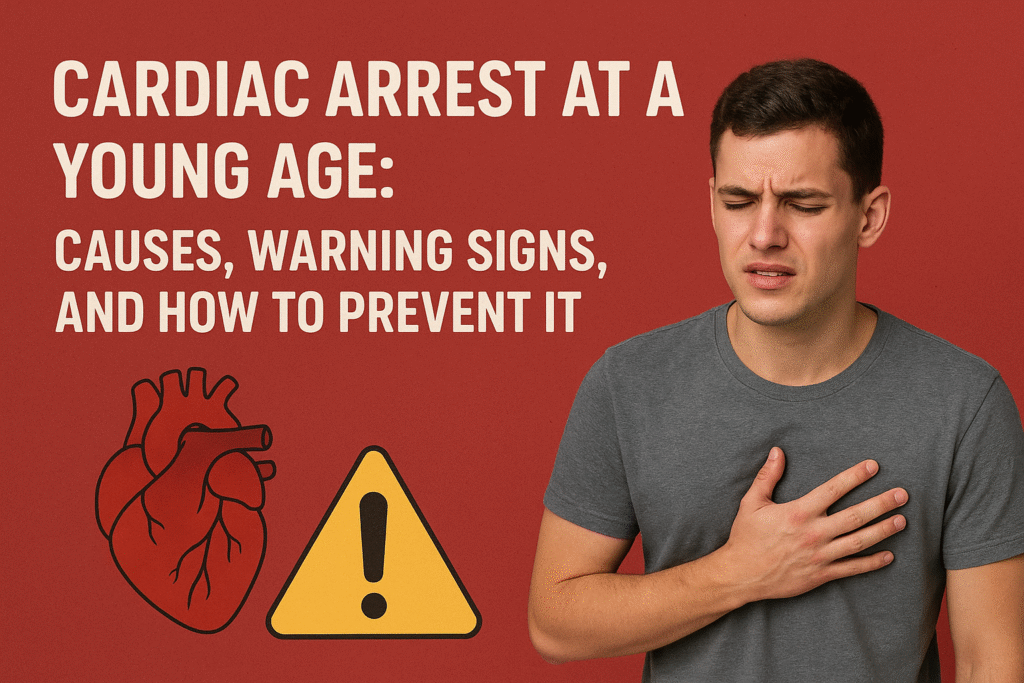When we think of cardiac arrest, most people imagine it as a health concern for older adults. However, in recent years, there has been a worrying rise in cases among young individuals—some even in their 20s and 30s. Sudden cardiac arrest (SCA) in the young can be devastating, as it often strikes without warning. Understanding the causes, recognizing early signs, and taking preventive measures can literally save lives.
As a trusted Cardiologist in Baner, Pune, Dr. Tanmay Kulkarni emphasizes that awareness is the first and most important step towards protecting your heart health—regardless of age.
What is Cardiac Arrest?
Cardiac arrest is a sudden loss of heart function, often caused by an electrical disturbance that disrupts the heart’s rhythm (arrhythmia). This stops blood from being pumped to the brain and other vital organs. Without immediate medical attention, it can lead to death within minutes.
It is important to differentiate between a heart attack and cardiac arrest. While a heart attack results from a blocked artery, cardiac arrest is usually an electrical issue that can occur even without blocked arteries.
Why Cardiac Arrest is Happening at a Young Age
There are multiple reasons why more young people are experiencing cardiac arrest today:
- Undiagnosed Heart Conditions
Some individuals are born with structural heart defects or inherited rhythm disorders (like Long QT Syndrome or Brugada Syndrome) that remain undetected until a serious event occurs.
- Lifestyle Factors
Sedentary habits, excessive screen time, poor diet, and lack of regular exercise are creating a fertile ground for cardiovascular issues—especially when combined with obesity and metabolic disorders.
- Excessive Stress and Work Pressure
Young adults face immense academic, professional, and social pressures, which elevate stress hormones like cortisol, affecting heart rhythm and blood pressure.
- Substance Abuse
Smoking, excessive alcohol consumption, and the use of recreational drugs like cocaine or amphetamines can trigger sudden arrhythmias and cardiac arrest.
- Post-Viral Complications
Viral infections, including certain strains of influenza or COVID-19, can inflame the heart muscle (myocarditis), increasing the risk of sudden cardiac arrest.
- Extreme Physical Strain
Sudden intense workouts, especially in untrained individuals, can sometimes put dangerous stress on the heart—particularly if there is an undiagnosed underlying condition.
Warning Signs You Shouldn’t Ignore
While cardiac arrest can occur without warning, there are often subtle symptoms in the days or weeks beforehand. As a leading Heart specialist in Pune, advises paying close attention to these red flags:
- Unexplained chest pain or discomfort during rest or activity
- Unusual shortness of breath without exertion
- Heart palpitations or feeling like your heart is racing or skipping beats
- Fainting or near-fainting episodes (especially during exercise)
- Extreme fatigue not related to physical activity
- Family history of sudden unexplained death or heart disease at a young age
If you or someone you know experiences these symptoms, it is crucial to seek medical evaluation immediately.
How to Prevent Cardiac Arrest at a Young Age
Prevention starts with awareness and proactive heart care. Here are some evidence-based steps:
1. Get Regular Heart Check-Ups
Even if you feel healthy, periodic heart screenings can detect silent problems early. This is especially important if you have a family history of heart disease or sudden cardiac arrest. Consulting an experienced Cardiologist in Baner, Pune can help assess your risk and guide preventive measures.
2. Maintain a Heart-Healthy Lifestyle
- Balanced Diet: Focus on fresh fruits, vegetables, whole grains, lean proteins, and healthy fats.
- Limit Junk Food: Avoid trans fats, excessive sugar, and processed snacks.
- Regular Exercise: Aim for at least 150 minutes of moderate activity per week, but always start gradually and consult a doctor before intense workouts.
3. Manage Stress Effectively
Yoga, meditation, deep breathing exercises, and hobbies can help reduce mental stress and protect heart health.
4. Avoid Harmful Substances
Completely avoid recreational drugs, limit alcohol intake, and quit smoking to drastically lower your risk.
5. Monitor Key Health Parameters
Keep an eye on blood pressure, cholesterol, and blood sugar levels. Even minor imbalances in young adults can escalate into bigger problems later.
6. Learn CPR and Emergency Response
In many cases, immediate CPR from bystanders can double or triple the chances of survival in cardiac arrest. Learning this skill can save lives in your community.
When to See a Cardiologist
Don’t wait for an emergency to take heart health seriously. If you have:
- Recurrent chest discomfort
- Episodes of dizziness or fainting
- A known family history of early cardiac events
- High blood pressure or cholesterol at a young age
…it’s time to consult a Heart specialist in Pune who can perform detailed diagnostic tests like ECG, echocardiography, stress testing, or advanced cardiac imaging.
Conclusion
Cardiac arrest in young people is no longer a rare occurrence, but with the right awareness, screening, and preventive strategies, it is often avoidable. Your heart is your most vital organ—protecting it should be a lifelong commitment.
Dr. Tanmay Kulkarni, a highly experienced Cardiologist in Baner, Pune, is dedicated to helping individuals of all ages safeguard their heart health through early diagnosis, personalized treatment plans, and preventive guidance. Remember, it’s never too early to take your heart seriously—the steps you take today can save your life tomorrow.
📞 Book an Appointment: 8551913753
🌐 Visit Our Website: www.drtanmaykulkarni.com


 Select an element to maximize. Press ESC to cancel.
Select an element to maximize. Press ESC to cancel.